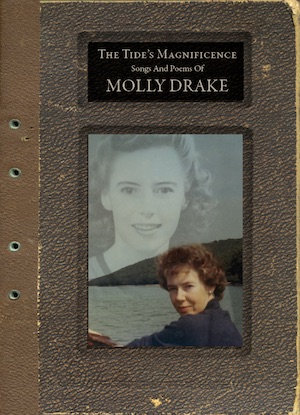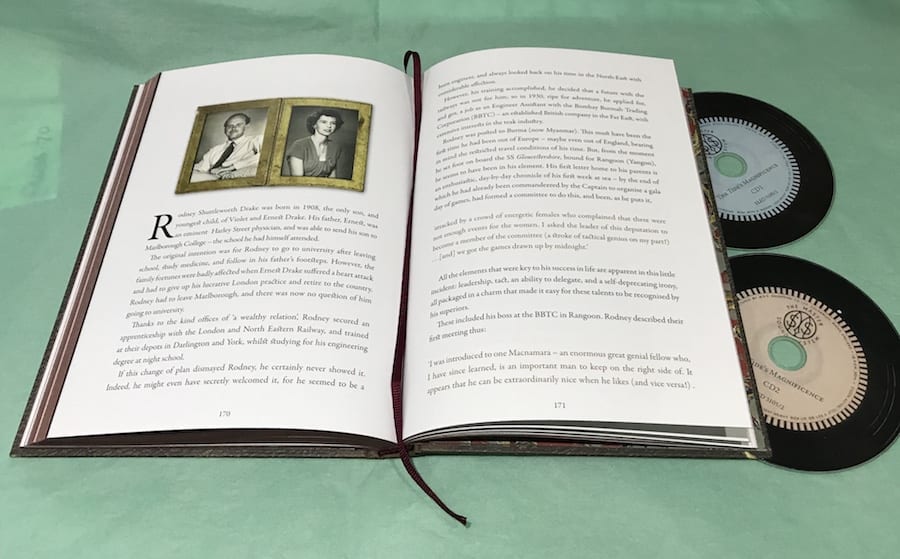 Molly Drake – The Tide’s Magnificence
Molly Drake – The Tide’s Magnificence
Fledg’ling Records – 23 February 2018
‘I have gone stale;
And the words that were their own illumination
Are guttered candles.’
So begins I Have Gone Stale, one of the many remarkable and moving poems from The Tide’s Magnificence, a lovingly compiled collection of songs and poems by Molly Drake, most famous until now for being the mother of one of music’s most revered and tragic personalities. Even from a tiny snippet like this, it is tempting to make superficial comparisons between Nick and Molly Drake. Foremost is the shared implication that whatever they write is somehow insufficient, that there is always an artistic peak just beyond them, and this is ironic: for when they are in this mode it is when both come closest to achieving a kind of artistic perfection. Both are acutely aware of the fragility of creativity and of the creative life. Where they differ, perhaps, is that in the long run, Molly was able to distance herself from the harsher effects of this kind of life, whereas Nick, who circled closer to the flame of public prestige, became its victim.
But there is more to Molly Drake than the relationship of her art to that of her son, and this extensive set – 26 songs on CD, 79 poems, photographs and supportive essays – provides a career overview that does justice to her rare, quiet talent. Drake’s songs are from another time and place. Mostly recorded in the 1950s and 1960s, and backed by her own delicate piano, they owe more to the songs of stage and music hall than to folk music. Given their innate intimacy – and of course the technological shortcomings of the era – they are remarkably clear. Many contain references to a natural world that is just out of human reach. Little Weaver Bird’s prettiness is sublime, and Cuckoo Time is steeped in the wish for summer, for better times.
Drake is equally at home with pithy rhymes and pop sensibility. ‘Love’s a whisper, love’s a shout, love’s a flame that could go out,’ she sings on Love Isn’t A Right, a song that in other hands could probably have been a hit. But even here she can’t resist darkening the scene: ‘Love’s all beauty but make it a duty and love will lie right down and die.’
Other songs, like How Wild The Wind Blows, have the simplicity of nursery rhymes, and the brevity of something written in the moment, in the knowledge that few outside Drake’s immediate family group would hear them. This simplicity, and the themes of travel, longing and countryside found in songs like the lyrically assured I Remember, have pre-echoes of artists like Sibylle Baier and Vashti Bunyan.
Drake’s voice, like her piano-playing, is clear and unembellished, reaching surprisingly virtuosic heights on songs like Ballad. It works beautifully as a counterpoint to the hidden darkness of her imagery, which surfaces in unexpected patches – the ‘dark of December’ that creeps into Fine Summer Morning, or the hope tinged with resignation in Some Other Spring. She also writes extremely well about childhood and memory: Breakfast At Bradenham Woods is pierced by startling images of sunlight and the wisdom to recognise that the best memories can never be artificially recreated. Songs like Poor Mum have gathered a layer of poignancy with time and hindsight.
In terms of theme and style, the poems are similar to the songs. She spent large swathes of her life in various subcontinental outposts – her father was an officer in the Indian Civil Service, and she met her husband, Rodney, in Rangoon (now Yangon, Burma). Her most prolific period as a poet seems to have been the 1940s when she spent time in Delhi, and the Pakistani towns of Jhelum and Murree. Knowledge of this gives extra weight to the deep longing expressed in her poems. The sadness and darkness is more visible than in her songs, and it is tempting to try to divine the fate of her son in pieces like Epitaph (1943) or The Ruin (1944) with its images of dead leaves, cold sunlight and ‘the long-imprisoned organ note, captured within the hollow courts of time.’ But this would diminish their power. Such notes of despair are just as easily attributed to the state of world affairs at the time, and indeed some of the poems deal directly with the effects of war. And of course, Drake had her own creative concerns, her own battles, some of which can be guessed at from her words.
The Tide’s Magnificence collects together the complete poems and songs of Molly Drake. The entire recorded creative life of a unique woman living in unusual circumstances, whose influence was to give rise to one of the most beloved musicians of the following generation. This alone makes it an important document. But Drake is of greater worth than that. She was a songwriter of vivid vision and an author of strange, calm, ambiguous poems which deserve to be remembered on their own terms. This release will go some way towards making sure that happens.
The Tide’s Magnificence comes as a full-colour 196-page hard-back case-bound and stitched book printed on contrasting paper stock with printed page edges. The book contains 79 poems by Molly Drake, lyrics to the songs, a 14 page introduction by her daughter, the actor Gabrielle Drake, photos, diary extracts, song manuscripts and handwritten notes by Molly, as well as the essay Give Me A Place To Be, which previously appeared in the book about Nick Drake: Remembered For A While,
There are two CDs containing 26 songs. The first CD was originally released as a limited private pressing in 2013, the second contains 7 unreleased songs all of which were recorded in mono in the 1950s on home tape recorders by Molly’s husband Rodney Drake. The songs were digitally transferred by Nick’s producer and engineer; John Wood and mastered by Simon Heyworth at Super Audio Mastering carefully preserving the varying qualities inevitably found in such old recordings.
Many of the songs and poems were so exquisitely performed on the 2017 tour by The Unthanks and recorded on their CD and Vinyl release: ‘The Songs Of Molly Drake’ (reviewed here)
The Tide’s Magnificence is a limited edition, there will only be one pressing of the set before it is made available as a single CD.
Order via Fledg’ling

